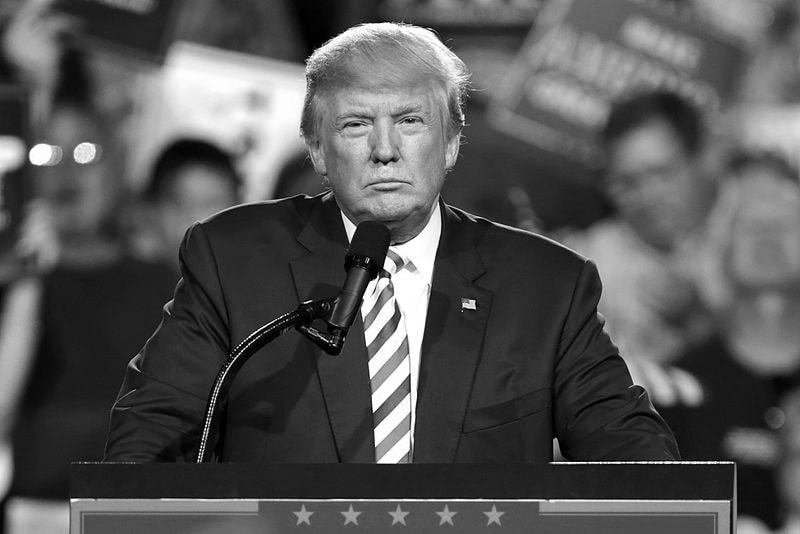IS TRUMP A PSYCHOPATH?
| Rating Donald Trump on a list of 20 unflattering personality traits. And what it tells us about the 45th president. |
 MR. O
MR. O For one thing, that lets him off the hook; he’s evil, regardless of whether he’s ill. And it’s unfair to group him with people who have genuine mental health problems.
But as we were looking for the one word in the English language that perfectly describes the 45th president – rogue, scumbag, fiend, killer, bounder, etc. – we came across sociopath, which, in Merriam-Webster’s online dictionary, led us to psychopath.
What intrigued us was the simple, you-can-do-this-at-home way to identify a psychopath: a list of 20 personality traits – none of them flattering – that lets you know if someone is indeed a bad dude.
Of course, it’s not an original idea to use pseudo-medicine to explain Trump. Books have been written by professionals, and Trump antagonist George Conway covered the topic in The Atlantic magazine last October.
But ours may be the first such analysis by a dog and an opossum.
I should explain about the “we.” I’ve been chatting with Mr. O – the optomistic opossum, who appeared in our yard earlier this year, long enough to be photographed by the Humans, who think he disappeared.
But he's still around, and he and I talk politics almost every evening. At some point, we ran across Psychology Today magazine’s website and found the “Hare Psychopathy Checklist.” We were excited to see it was created by a fellow backyard citizen, one with floppy ears. But later, we learned it was developed by a Canadian researcher, Robert Hare – our lesson here being that to Hare is Human.
Anyway, Psychology Today warns that “A true assessment should be conducted by a mental health professional.”
RIGHT. So, if you want to try this at home, here’s the list. (Scoring: 0 - Doesn’t apply; 1 – Applies somewhat; 2 - Fully applies)
#1- Glibness/superficial charm
#2 - Grandiose sense of self-worth
#3 - Need for stimulation/proneness to boredom
#4 - Pathological lying
#5 - Conning/manipulative
#6 - Lack of remorse or guilt
#7 - Shallow affect (i.e., reduced emotional responses)
#8 - Callous/lack of empathy
#9 - Parasitic lifestyle
#10 - Poor behavioral controls
#11 - Promiscuous sexual behavior
#20- Criminal versatility (i.e., commits diverse types of crimes)
OKAY. Let's get started, with the first character trait.
#1 – Glibness/ superficial charm
| Actually, throughout my life, my two greatest assets have been mental stability and being, like, really smart. Crooked Hillary Clinton also played these cards very hard and, as everyone knows, went down in flames. I went from VERY successful businessman, to top T.V. Star..... to President of the United States (on my first try). I think that would qualify as not smart, but genius....and a very stable genius at that! |
#2 – Grandiose sense of self-worth
But that’s the lazy way. Here’s something we found in Trump’s acceptance speech to the Republican National Convention, July 31, 2016:
| Nobody knows the system better than me, which is why I alone can fix it. |
#3 – Need for Stimulation/ proneness to boredom
| I get bored too easily. My attention span is short. |
| Schwartz “…asked Trump to describe his childhood in detail. After sitting for only a few minutes in his suit and tie, Trump became impatient and irritable. He looked fidgety, Schwartz recalls, “like a kindergartner who can’t sit still in a classroom.” Even when Schwartz pressed him, Trump seemed to remember almost nothing of his youth, and made it clear that he was bored. Far more quickly than Schwartz had expected, Trump ended the meeting. |
#4 – Pathological lying
This is pathetically easy to answer. The Washington Post’s “Fact Checker” has been keeping count since Trump’s inauguration. In June the Post wrote:
| As of May 29, his 1,226th day in office, Trump had made 19,127 false or misleading claims, according to the Fact Checker’s database that analyzes, categorizes and tracks every suspect statement he has uttered. That’s almost 16 claims a day over the course of his presidency. So far this year, he’s averaging just over 22 claims a day, similar to the pace he set in 2019. |
| Reagan’s tax cut amounted to 2.9 percent of the gross domestic product and none of the proposals under consideration came close to that level. Yet Trump persisted in this fiction even when the tax cut was eventually crafted to be the equivalent of 0.9 percent of GDP, making it the eighth largest tax cut in 100 years. |
#5 – Conning/ manipulative
| Trump snookered rivals into believing that he had an exclusive option from the city on the project, when he didn’t. Trump also deceived his partner in the deal, Jay Pritzker, the head of the Hyatt Hotel chain. Pritzker had rejected an unfavorable term proposed by Trump, but at the closing Trump forced it through, knowing that Pritzker was on a mountain in Nepal and could not be reached. |
#6 – Lack of remorse or guilt
 AT MOUNT RUSHMORE, July 3, 2020. where Trump staged a rally, ignoring Covid-19, fire dangers. CREDIT: Associated Press
AT MOUNT RUSHMORE, July 3, 2020. where Trump staged a rally, ignoring Covid-19, fire dangers. CREDIT: Associated Press Setting aside Trump’s racist and provocateur’s rant, he certainly showed no guilt in convening a Covid-19 super-spreader event, in which attendees were too close together, most not wearing masks; in arranging a fireworks display when the landscape was at risk of wildfires; in placing himself among four truly monumental presidents carved into the mountain; in ignoring the objections of Native Americans whose land is both scared and stolen.
#7 – Shallow affect (I.E., reduced emotional responses)
| It was so fast. He didn't give me the opportunity to even speak. It was hard. I was trying to talk to him, but he just kept like pushing me off like, “I don’t want to hear what you’re talking about.” I just told him I want justice. |
#8 – Callous/ lack of empathy
| ALEXANDER: “What do you say to Americans who are watching you right now and are scared?” TRUMP: I’d say that you’re a terrible reporter, that’s what I’d say. … I think it’s a very nasty question, and I think it’s a very bad signal that you’re putting out to the American people … “The American people are looking for answers, and they’re looking for hope. And you’re doing sensationalism. And the same with NBC and Concast — I don’t call it Comcast, I call it Concast…You should be ashamed of yourself. |
#9 – Parasitic lifestyle
| … he found that Trump’s father was instrumental in his son’s rise, financially and politically. In the book (Art of the Deal), Trump says that “my energy and my enthusiasm” explain how, as a twenty-nine-year-old with few accomplishments, he acquired the Grand Hyatt Hotel. Barrett reports, however, that Trump’s father had to co-sign the many contracts that the deal required. He also lent Trump seven and a half million dollars to get started as a casino owner in Atlantic City; at one point, when Trump couldn’t meet payments on other loans, his father tried to tide him over by sending a lawyer to buy some three million dollars’ worth of gambling chips. |
| Mr. Trump won the presidency proclaiming himself a self-made billionaire, and he has long insisted that his father, the legendary New York City builder Fred C. Trump, provided almost no financial help. But The Times’s investigation, based on a vast trove of confidential tax returns and financial records, reveals that Mr. Trump received the equivalent today of at least $413 million from his father’s real estate empire, starting when he was a toddler and continuing to this day. |
#10 – Poor behavioral controls
| What is unclear is how much thinking and working actually takes places in these off-hours, despite the protestations of some Trump aides — as opposed to tweeting, television-watching, gossiping and venting with friends and allies by telephone. |
| … the lack of structure yields a lack of orderly decision-making and discipline that can be a huge problem given the demands of the job. 'Executive’ is the last thing I would call unstructured time. |
If you’ve made this far, congratulations.
We’ll finish this tomorrow with Part 2, including the final score.





 RSS Feed
RSS Feed